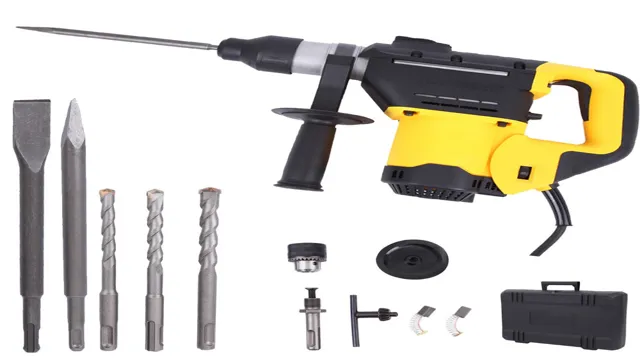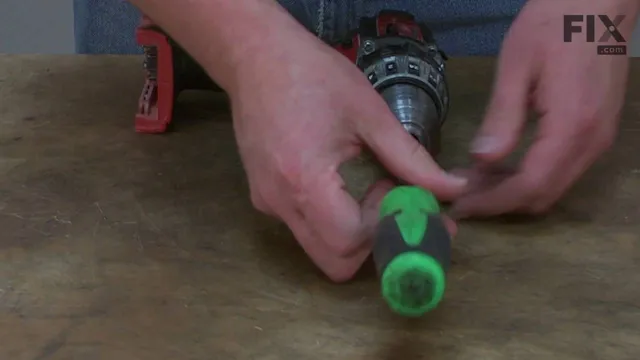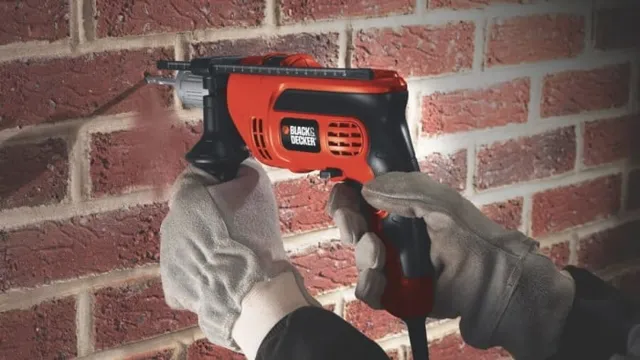Do You Need a Hammer Drill for Your DIY Projects? Here’s Everything You Need to Know!
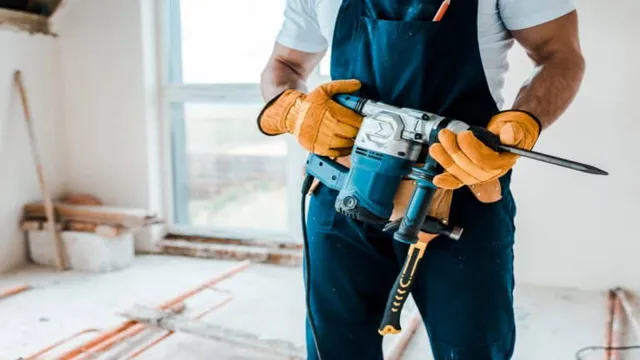
There are a few different types of power drills on the market, but one that you may have heard of is the hammer drill. If you’re not familiar with this tool, you might be wondering if it’s something you need for your next DIY project. The answer, unfortunately, is not a simple yes or no.
It really depends on what you’re planning to do. At its most basic level, a hammer drill is used for drilling into hard, dense materials like concrete, brick, or stone. If your project involves working with these types of materials, then a hammer drill could certainly come in handy.
It uses a combination of rotary and percussion forces to quickly and effectively bore through tough surfaces. On the other hand, if your project involves wood, drywall, or other softer materials, then a hammer drill is likely overkill. In those situations, a regular drill or even a cordless screwdriver might be all you need.
Of course, as with any tool purchase, there’s also the question of cost. Hammer drills tend to be on the pricier side, so if you’re only going to use it sporadically, it might not be worth the investment. But if you’re frequently working with tough materials or anticipate needing to drill into harder surfaces in the future, then a hammer drill could be a good investment.
At the end of the day, whether or not you need a hammer drill really depends on what you’re planning to use it for. If you’re still unsure, it might be worth talking to a sales associate at your local hardware store to get more information and advice.
What is a Hammer Drill?
If you’re thinking about starting a home improvement project, you might be wondering, “Do I need a hammer drill?” A hammer drill, also known as a rotary hammer, is a powerful tool that uses a hammering action to penetrate tough materials like concrete and brick. If you’re planning on drilling into these types of materials, a hammer drill is the way to go. The hammering action helps break up the material, making it easier to drill through.
However, if you’re just planning on drilling into wood or softer materials, a regular drill will work just fine. It’s important to choose the right tool for the job to ensure that your project is a success. So, if you’re planning on taking on a tough project, investing in a hammer drill is definitely worth considering.
Functionality and Uses of a Hammer Drill
A hammer drill is an excellent tool for drilling through materials like concrete, masonry, and brick that ordinary drills cannot handle. It is designed to create a hammering motion while drilling to make it possible to break through hard surfaces. This drill is an essential tool for professionals who work in construction, renovation, and building industries.
The hammer drill consists of several features, including a chuck, drill bit, motor, and handle. It also incorporates an adjustable depth gauge, a side handle, and a switch for selecting between hammer and drill modes. The hammer drill’s functionality is so unique that it can perform tasks that regular drills cannot, making it a popular choice for professionals in the field.
Its uses cover everything from building construction to home renovation and demolition work. The hammer drill is a versatile tool every construction worker or DIY enthusiast should have in their tool kit.
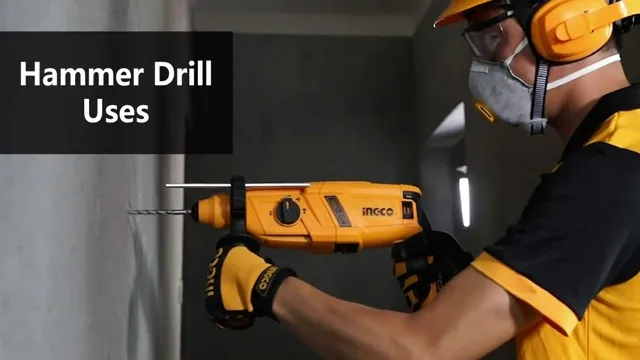
Advantages and Disadvantages of a Hammer Drill
A Hammer Drill is a powerful tool utilized by DIY enthusiasts and professional contractors alike. Its function is to bore holes through hard surfaces such as concrete or brick, and it accomplishes this feat using a dual-action mechanism. The rotary action of the drill bit drives the tool forward, and the hammering action of the drill head applies an additional force to help break through the dense material.
This tool is ideal when a traditional drill isn’t up to the task, and it can save time and frustration. However, a hammer drill has its disadvantages as well. Firstly, it’s noisy, and prolonged use can be quite tiresome.
Secondly, despite its power, a hammer drill can be dangerous if not used correctly, and it’s important to take necessary safety precautions before operating it. In summary, a hammer drill is a useful tool to have in one’s toolbox, but it’s important to understand its advantages and limitations before using it.
When Do You Need a Hammer Drill?
“Do you need a hammer drill?” is a common question for DIY enthusiasts and professionals alike. A hammer drill is useful for drilling into harder materials such as concrete and masonry. So, if you’re planning on hanging shelves or installing light fixtures on concrete walls, then a hammer drill is a must-have tool.
It’s also handy for tasks such as setting up a deck frame or building a retaining wall. A regular drill may struggle with harder materials and could take longer to complete the task, whereas a hammer drill can quickly power through the material with its hammering function. However, if you only need to drill into wood or soft materials, then a regular drill should suffice.
Ultimately, the decision to invest in a hammer drill will depend on the type of projects you’ll be working on.
Examples of Projects That Require a Hammer Drill
Hammer Drill When it comes to home renovation and DIY projects, there are certain tasks that require more powerful tools than others. One such tool is the hammer drill, which is used to create holes in tough materials like concrete and brick. Some projects that may require a hammer drill include hanging shelves, installing new light fixtures, or building a backyard retaining wall.
If you’re planning on doing any of these tasks, it’s essential to invest in a high-quality hammer drill to get the job done right. Using a standard drill may result in frustration and a job that is done poorly or not at all. A hammer drill has a special feature that enables it to create holes in tough materials quickly and effectively, saving you time and effort.
So, if you’re planning on tackling any home improvement projects that involve drilling into tough surfaces, make sure you have a reliable hammer drill on hand to get the job done.
Factors to Consider Before Purchasing a Hammer Drill
If you’re considering buying a hammer drill, one of the main factors to consider is whether you actually need one in the first place. Hammer drills are typically used for drilling into tougher materials like concrete or masonry, and are often favored by professionals in the construction industry. However, if you’re simply looking to do some light DIY around the home, a regular drill may do the job just fine.
When deciding whether to invest in a hammer drill, consider the types of projects you’ll be undertaking, and whether you’ll be drilling into tougher surfaces that require a hammer function. By taking the time to assess your needs, you can ensure you’re making a wise investment in the right tool for the job.
Alternatives to a Hammer Drill
Hammer Drill A hammer drill is a powerful tool that can make your DIY and construction projects easier and faster. However, it’s not always necessary to use a hammer drill for every project. If you are working on a project that involves drilling into materials like concrete, brick, or masonry, then a hammer drill is an excellent choice.
But if you’re working on softer materials like wood, drywall, or metal, then a regular drill may be sufficient. Additionally, there are other alternatives you could consider instead of a hammer drill, like an impact driver or rotary hammer. An impact driver is a powerful tool that can handle tough materials like concrete and masonry, but it’s also more versatile than a hammer drill due to its ability to drive screws and other fasteners.
On the other hand, a rotary hammer is a heavy-duty tool that can handle the toughest materials, making it the perfect choice for professionals. It can drill with a hammering motion, like a hammer drill, but it can also chisel and break up materials like concrete and stone. Overall, it’s important to choose the right tool for the job you’re working on rather than relying solely on a single tool like a hammer drill.
By considering your specific project needs and the materials you’re working with, you can make an informed decision on the best tool to use.
Conclusion
In conclusion, the question of whether you need a hammer drill ultimately comes down to what you plan on using it for. If you’re simply hanging pictures or drilling small holes, a regular drill will do just fine. But if you’re looking to tackle tougher DIY projects that involve drilling through hard materials like concrete or masonry, then a hammer drill is an essential tool to have in your arsenal.
So, the answer is clear: if you want to be a DIY superhero, invest in a hammer drill and let the drilling adventures begin!”
Final Thoughts on the Need for a Hammer Drill
If you’re tackling a DIY project that requires drilling through brick, concrete, or masonry, you’ll need a hammer drill. The hammer drill combines drilling with a hammering function that aids in breaking up tough materials. You can identify a hammer drill by its distinct noise and vibration.
It’s also important to note that while standard drills can drill into these materials, they typically take longer and exert more effort. Additionally, if you’re planning on purchasing a hammer drill, it’s important to consider the size and weight in relation to your project as larger models can be heavy and difficult to maneuver. By utilizing a hammer drill, you’ll save time and energy when drilling into those tough materials, making them a necessary tool for any DIY enthusiast or professional contractor.
Recommendations for Choosing a Hammer Drill
Hammer Drill If you’re planning on drilling into hard surfaces such as concrete or brick, a regular drill may not be enough for the job. This is where a hammer drill comes in handy. Hammer drills use a pulsating mechanism that creates a hammering action while it drills, making it more efficient when dealing with tough materials.
But how do you know if you need a hammer drill? If you’re simply putting up shelves or drilling into wood, a regular drill will suffice. However, if you’re working with concrete, masonry, or other hard surfaces, a hammer drill will save you time and effort. When choosing a hammer drill, look for one with a high wattage, variable speed settings, and a comfortable grip.
So, whether you’re a DIY enthusiast or a professional contractor, investing in a hammer drill will make your jobs easier and more precise.
FAQs
What is a hammer drill and how does it differ from a regular drill?
A hammer drill is a power tool that combines rotary drilling with a hammering action to break tough materials. Unlike a regular drill, a hammer drill has a hammering function that pounds the drill bit as it rotates.
When should I use a hammer drill?
You should use a hammer drill when drilling into hard materials such as concrete, stone, or brick. It’s also useful for drilling large diameter holes and for installing anchor bolts.
Do I need a special type of drill bit for a hammer drill?
Yes, you should use a hammer drill bit specifically designed for use with a hammer drill. These bits have a carbide tip that can withstand the hammering action and are more durable than regular drill bits.
Can I use a hammer drill for regular drilling tasks?
Yes, you can use a hammer drill for regular drilling tasks, but it may not be necessary and could damage softer materials such as wood or drywall. For these tasks, a regular drill is usually sufficient.
How do I choose the right hammer drill for my needs?
Consider the size and type of projects you’ll be working on, the power source (electric or battery-powered), and the speed and hammering options of the drill. Look for a drill with a comfortable grip and adjustable handle for ease of use.
What safety precautions should I take when using a hammer drill?
Wear appropriate personal protective equipment such as eye and ear protection, and follow the manufacturer’s instructions for safe use. Keep your work area clean and free of debris, and be aware of any potential hazards such as live wires or pipes.
How do I maintain my hammer drill?
Regularly clean and oil the drill, and replace any worn or damaged parts as needed. Store the drill in a dry, cool place and avoid exposing it to extreme heat or cold. Follow the manufacturer’s recommendations for maintenance and care.

